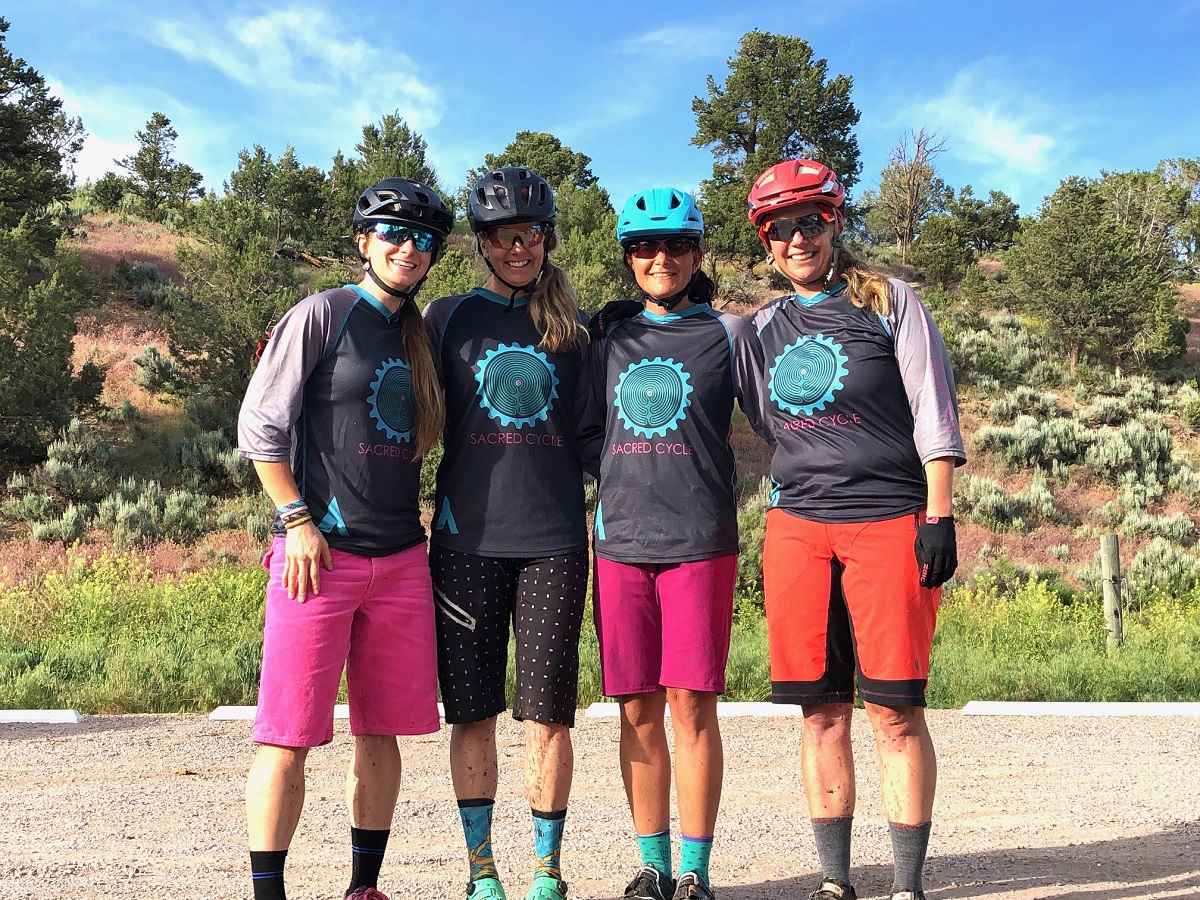An Out-of-the-box Solution to Healing from Sexual Trauma
The #metoo movement continues to expose an uncomfortable reality: if you are female, you will probably face some form of sexual harassment, assault, or abuse in your lifetime. According to the National Sexual Violence Research Center, one in three women in the U.S. will experience some form of sexual violence. People from marginalized sexual orientations, gender identities, or racial and ethnic identities face disproportionately higher levels of violence. Sexual trauma can manifest as persistent emotional and physical stress and dissociation from the body.
So for the millions of people who have been through this, what’s next? What do you do with these experiences? For Heather Russell and the Sacred Cycle team, you spin them into resilience, community, and joy.
Heather Russell is the founder of Sacred Cycle, a Colorado-based nonprofit that provides affordable therapy to survivors of sexual assault. The program includes counseling with a licensed therapist, mountain bike coaching and gear, and a community support network. Sacred Cycle launched in 2013 and continues to expand its breadth and depth of services. I recently spoke with Heather to learn more about how cycling can help women heal from sexual trauma.

Laura: Tell me about the mission of Sacred Cycle.
Heather: Our mission is to support survivors of sexual trauma: to help eliminate the stigma and shame that surrounds it, to build a community around our clients, and help introduce them to different ways of thinking about their treatment and recovery — out-of-the-box solutions to what they have experienced.
Laura: That’s one of the things that’s so interesting to me about this programming; it is out-of-the-box, it is something very different. How did you come to understand that cycling is a part of healing?
Heather: Yeah, I mean people are always asking, what is the therapy that you’re doing, the biking therapy? And, in truth, it’s really not so much about the type of therapy we’re doing with clients — as in particular interventions we’re doing on the bike — but it’s more about just introducing people to riding bikes and seeing what happens.
I had the idea for this program when I was in grad school for counseling, and I was also starting to face my own sexual trauma. I was training for bike races and I noticed — it just kind of all came to me — that I would love to be able to provide this experience to other women because it’s just so amazing. You know, I’m out here having peak experiences on my bike, and I want to know how I can help other women experience this. So I guess the idea for the program was: if this works for me, I wonder if other women would find the same joy and healing that I’ve been fortunate enough to experience.
Laura: And so you turned this feeling of joy on the bike into a therapy program for other women?
Heather: Yes, and it started with me wanting to provide a free program where survivors would have ongoing support through the process of healing. It’s so expensive to heal from trauma. For a lot of our clients, what’s happened is so horrific. And I wanted to offer a gift, like “this terrible thing happened to you and you deserve to be acknowledged and loved.” People have helped me over the years, and I wanted to pay it forward. So we offer a very affordable program and great scholarships.
Laura: And so do you think it was just the capacity to feel joy that was so healing? Or is there something else, is there some other thing going on with that repetitive motion of cycling?
When you’re in the flow, in the sweet spot, you’re able to feel your feelings.
Heather: I would definitely say it’s multifaceted. Sometimes when I’m on my bike, particularly on long rides, I go through a myriad of emotions. And it’s like, this is it, I’m stuck with myself right now. And I have the choice to either tune in or tune out. As a survivor of trauma, the tendency is to check out because it’s so, so uncomfortable, so difficult to experience. And so when I was developing the program on the bike that summer, I became really aware of that gift, the opportunity over and over again to come back to my body and to feel what was actually going on inside.
And there’s just so much going on. When you’re in the flow, in the sweet spot, you’re able to feel your feelings. You can think and feel at the same time. When you’re experiencing the symptoms of your trauma, you’re not necessarily thinking and feeling at the same time. The bike is just one way that’s helped me to stay in the flow, in what’s called the window of tolerance.
Laura: You’ve talked in other interviews about the healing power of nature and healthy risk-taking. What do you mean by that?
Heather: Yeah, I think the risk-taking part of mountain biking, in particular, is also at play here. With mountain biking, there’s a lot of opportunity for failure, and with that comes the opportunity for growth. Once you make a decision to try something challenging like a tricky rock feature, or even to get on the bike at all, and you realize that you can do more than you thought you could and you have a chance to do that over and over again each time you go out, it’s pretty inspiring. It’s amazing to watch women building confidence before your eyes!
Cycling becomes a metaphor for dealing with lots of different things in your life.
One of the themes that I see frequently is feelings of unworthiness and comparing oneself to other people: like, look, that other person is able to do this, why can’t I do this? And that’s a common theme with women in general — it’s not just survivors, it’s a lot of women. When you’re on the bike, you can really notice these feelings and work with them. Cycling becomes a metaphor for dealing with lots of different things in your life.
And then there’s the benefit of being in nature and of riding with other people; the cycling community is just so fun and accepting. That’s my experience anyway. It just gets you out of your own head and provides opportunities to not isolate yourself, which is a theme overall for survivors of trauma.
Laura: One of the problems that keeps coming up for some women is a persistent fear of sexual assault associated with being in nature, hiking and biking alone or with other women. So there is this massive fear that is preventing women from independent motion in nature, but it seems like there is also this inherently healing aspect to independent motion in nature. Can you speak to that juxtaposition?
Heather: Yeah, I don’t know. It sucks to feel that. I made a choice when I was young not to let that fear overtake or take away these experiences in nature. And, you know, I’ve spent a lot of time camping, biking, or running alone in the woods. I don’t prefer that at all. But if it comes down to not having the experience, then I choose to have the experience. If I can’t find somebody to go with, then I’m going to go anyway. It’s been my choice. What do you tell other women about this?
Laura: Well, I’m trying to figure that out! For most of my life, I was in that cohort of folks who would say, “Don’t worry, just go out and do anything!” Because you want that positivity. And I feel that positivity! But I’ve also been on bike trips where I’ve been scared. Especially if you’re going to certain areas of the world, you’re going to be harassed. So you have to deal with that, you have to learn how to deal with it. But this understanding that cycling in nature can also be healing and empowering for women — this is such an important, positive response. Because it’s true, and because it shifts the way we consider these issues in the first place.
Heather: It’s such an interesting topic. You do hear about sexual harassment in the backcountry. I think it doesn’t happen to me as much now that I’m older, but when I was younger I was getting hit with it all the time. It’s just so interesting what men say to you in the backcountry.
Like a guy is riding behind you and you say, “Do you want to pass?” and they say “No, I’ll hang out back here. The view’s much better.” That happened to me this summer. I was like, really, that’s STILL happening?
Laura: It’s such a crazy thing. But you still go out there. Even after all of what’s happened in your life. That’s amazing. And it’s worth it?
Heather: It is. It is worth it. It feeds my soul. I don’t know — everything I’m thinking to say sounds like a cliché — it feeds my soul. It does, it fills me up. I don’t want to miss out on that because of my fears.
But there are people who will really look down on women in particular for being in the backcountry alone. They’ll say it’s irresponsible if you get hurt, let alone if you get sexually assaulted. There’s a lot of shaming that happens there.
Laura: So that actually goes back to the very first thing you said, that the mission of Sacred Cycle is to help people eliminate shame. It goes full circle to shame being a central element to how women experience sexual assault or abuse or harassment. And cycling can actually help women move through that.
Heather: And a big part of it is just being willing to talk about what you’ve experienced, and also having a community around you. Having the opportunity to share your commonalities with someone else and realize that you’re not alone in what you’re experiencing. And I think it can be such a breakthrough for people when they finally make that decision to talk to a therapist or talk to peers and have the whole thing that we are promoting encompassed in that. I think that’s what speaks to a lot of people.
And cycling is a huge part of it. It’s really about the community. And it’s just so fun. That’s a huge part of what I wanted — the fun part of the whole program!
I had an eating disorder, and I went through years of eating disorder recovery. And for a while, my whole life was my eating disorder and how to recover from it. Ultimately I was able to heal from that for the most part, but I think what struck me was just how depressing the whole thing was. And how lucky I was to have nature and the ability to get outside and be around other like-minded people. And it was just so rewarding and fun.
And I noticed that a lot of people who really weren’t recovering as well were pretty isolated, and their whole world was their eating disorder recovery. Their friends that they did have were only in the eating disorder recovery world. And I think [with Sacred Cycle] I wanted to offer to people something else — yes, you’re dealing with this really awful thing and you’re going to therapy and you’re addressing your trauma and it sucks sometimes — but then here’s also this other thing with cycling that we can help you with. Offering supplements to addressing the trauma, that’s been a big part of the whole mission.
Laura: Is there anything else you’d like to share about Sacred Cycle?
Heather: We’re always looking for volunteers, board members, and passionate people with new ideas. That’s one of the fun things about Sacred Cycle is just connecting people from all over the country and the world actually. My desire has always been for Sacred Cycle to be a collaborative thing. So that’s what really excites me, connecting with people. And it’s exciting that we have new people coming on board who resonate with our mission!

